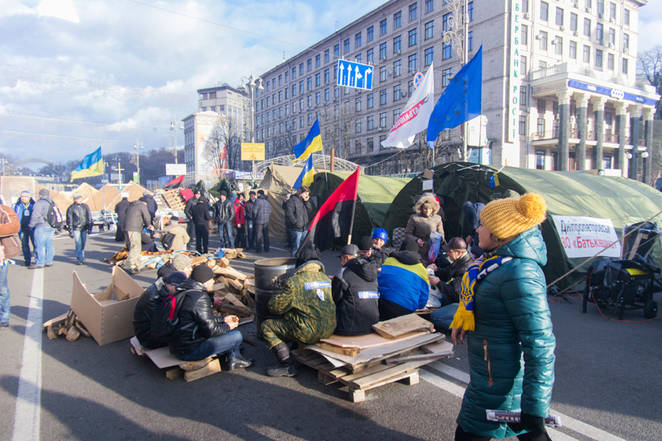...and also for yours. Two Western European lawyers visited their colleagues in Kiev this month. They got to see the protests with their own eyes, and were introduced to the many obstacles lawyers face in Ukraine when they do their job defending law and justice.
Kiev, one cold February morning. A car drives through the Ukrainian capital towards the Independence Square, which by now is well-known all around the world as the epicenter of the protests against the government of President Yanukovich. The men in the car are not here to discuss geopolitics, however. They are lawyers. Their job is the rule of law and the defense of those who face troubles with justice – this is why they are here.
Approaching the square, the car is stopped by policemen. An Ukrainian lady in the car opens the window and discusses with them, shows some papers, and the car is allowed to drive further. She and her colleague are escorting two foreign lawyers to the square: Christian Bock (President of Eurojuris Germany) and Hans Jonkhout (President of Eurojuris International) who were invited by their Ukrainian colleagues to witness the many difficulties they meet in the exercise of their profession in this city.
“When we made it to Independence Square,” recounts Hans, “we saw tents set up all over the square; it smelled of the fires heating them and also of burning tires. The barricades were three or four metres high, and we passed through some sort of gate carved into them. It was made of sacks filled with sand or other waste, burned cars, tyres, wires of all kinds. From different places we could also hear loud music.”
Christian, Hans, and their Ukrainian hosts were led to the House of Unions, a building converted into a sort of headquarters for the protesters. Here, they were introduced to the men in charge of security. “They were concerned about potential infiltrators from the authorities and only allowed us in after we showed our passports,” explains Hans.
Inside these headquarters, protesters organised themselves. Computers, an improvised press centre, places to rest and sleep, people getting ready to take their shift occupying the square. Outside the headquarters, Christian and Hans saw memorials to fallen protesters killed in recent weeks. They passed by an old lady bringing boiled eggs and sandwiches: she asked where she could give them to protesters. Like many people from Kiev, she was providing them with food from her own kitchen. A bit further away, the two lawyers were allowed to climb up another, bigger barricade: from there, they could see the Parliament building, where the hopes for an agreement could be discussed. “There was again loud music there, it was as if a battle of sounds was going on,” says Hans.
But Hans and Christian were not only here to visit the place. They were invited by two Ukrainian lawyers, Vitaly Tytych and Oleksii Bezhevets, both members of Eurojuris Ukraine. During the whole crisis, Vitaly and Oleksii witnessed blatant abuses of justice and have been very active in trying to make a difference. In an effort to give information to Hans and Christian, they introduced them to the Ukrainian Bar Association. “It is in fact one of four such organisations in the country,” explains Hans. “From them, we learnt that courts and judges in Ukraine are not independent. Furthermore, attorneys are deprived of the possibility to preserve secrecy and confidentiality”.
Vitaly and Oleksii have given precise examples of abuse. After the visit of Independence Square, they organised a press conference with Liga, the Ukrainian press agency. There, Vitaly explained the case of Viktor Smalyy. According to Vitaly, Viktor was “a lawyer imprisoned for doing his job. He was an attorney for an independent organisation of lawyers and journalists who investigated corruption and crimes of the Ukrainian traffic police. Viktor was arrested on December 9th last year and was subsequently beaten and tortured.”
For the lawyers, Viktor Smalyy's case is a cautionary tale of what is happening in their country. “Viktor Smalyy is currently in pre-trial detention, which lawfully can last up to sixty days pending the investigation. But under Ukrainian law, pre-trial detention should only apply in cases of crimes punishable by imprisonment of five years or more, whereas the crime for which he was charged carries a maximum four-years term under the Ukrainian Penal Code,” explains Vitaly.
“We were lucky,” concludes Hans, “as the day after we left on February 15th there were new and serious outbursts between police and protestors, with more than 25 people killed and around 1000 injured.” In the next few days, however, the resignation of President Yanukovich and the liberation of his rival Mrs Tymoshenko seem to have calmed down the protests. But will the situation of lawyers improve? Only time will tell. Until then, they will remain vigilant...
Any reaction to this story? Please write to us at journalist@eurojuris.net


